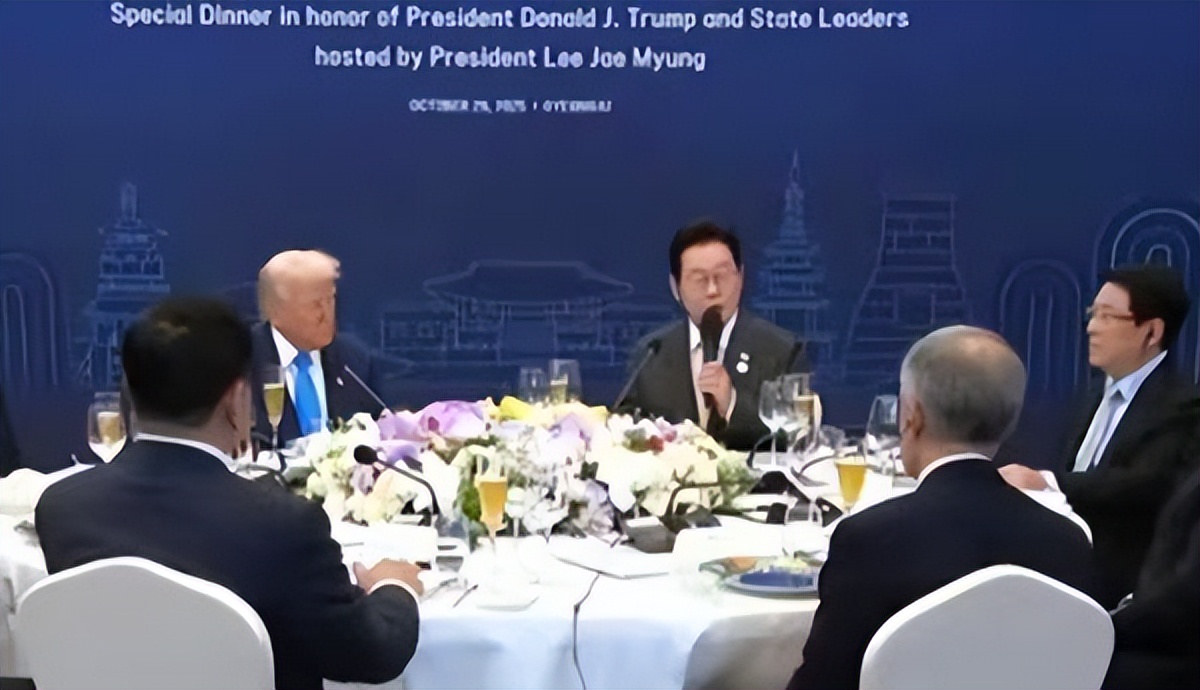The current U.S. President Trump has arrived in South Korea, starting the final leg of his Asian tour.
On the first day of his arrival in Gyeongju, South Korea, Trump received a "greeting gift" carefully prepared by Lee Jae-myung, a royal golden crown replicated from a Silla gold tomb, along with the highest honor of South Korea, the "Order of the Paulownia Flowers".

When Lee Jae-myung announced that Trump was the first U.S. president to receive this medal, Trump couldn't help but show his delight on the spot, saying, "It's really beautiful, I want to wear it right now."
This unfiltered admiration is very much in line with Trump's outgoing personality, and it also indirectly proves that South Korea's strategy of "meeting his preferences" has been effective.
After all, Trump has always favored luxurious symbols and unique respect. Additionally, at the lunch, Lee Jae-myung specially prepared golden desserts and local dishes that matched Trump's taste, fully demonstrating attention to detail.
Naturally, Lee Jae-myung's efforts to "flatter" Trump boil down to "exchanging courtesy for benefits." After all, if you give enough face, it's easier to discuss the "substance" at the negotiation table.
It should be noted that although the U.S. and South Korea had previously finalized a $35 billion trade framework, they have been stuck in a deadlock on implementation details.
The U.S. strongly demanded that South Korea pay the full investment amount upfront, which poses a huge risk for South Korea. If the full amount is transferred, it could drain foreign exchange reserves and impact the Korean won's exchange rate.

For this reason, Lee Jae-myung publicly stated a few days ago, emphasizing that "the U.S. cannot bring catastrophic consequences to South Korea."
However, the South Korean auto industry has been stuck for several months with a 25% high tariff, while Japan has already taken the initiative by reducing its tariff to 15%. If the situation doesn't change, losses will continue to expand.
Therefore, Lee Jae-myung hopes to "soften" the U.S. position through high-level hospitality.
As of now, Trump has revealed that he has "almost finalized" a trade agreement with South Korea, but has not released specific details.
Korean officials have confirmed this news, and Kim Yong-bum, the head of the policy office, also disclosed specific details:
In the $35 billion investment to the U.S., 20 billion will be invested in cash in installments, with an annual limit of 2 billion.
To reduce risks, South Korea will specifically adopt a special company structure, allowing the loss of one project to be offset by the gains of another. If the principal cannot be recovered within 20 years, the profit-sharing can be adjusted.
Has the U.S. made any concessions? According to Kim Yong-bum's statement, as a response to South Korea's investment, the U.S. agreed to lower the tariff on South Korean cars from 25% to 15%, the same as Japan.

At the same time, the U.S. will also grant the most-favored-nation treatment in pharmaceuticals, implementing zero tariffs on aircraft parts and generic drugs, and making concessions in the semiconductor sector.
But it must be said that this result is a product of South Korea's "tearful compromise." The current installment plan is only keeping South Korea barely within the risk limit.
It is worth mentioning that the South Korean public has already been in an uproar. On the day of the U.S.-South Korea meeting, more than 20 groups protested in Gyeongju, clashing with police.
Kim Young-wook, a former presidential candidate of the Democratic Labor Party, expressed anger at a rally, voicing the sentiments of many people: "Countries around the world are flattering Trump just to get him to lower a few percentage points of tariffs. That's absurd!"
Surveys also show that 80% of Koreans believe the requirements for investment to the U.S. are unfair. Economists have warned that the annual outflow of 2 billion in cash may divert domestic investments, affecting employment. During the 20-year investment period, if the U.S. economy fluctuates, the safety of the principal is questionable.

Nevertheless, this "deal" is not yet completely finalized. A South Korean official privately revealed that the differences between the U.S. and South Korea have not been completely eliminated, but the gap has narrowed.
In short, this seemingly prosperous diplomatic gesture is ultimately a matter of interest exchange. Trump has achieved the results of "allies obeying and having investments," while Lee Jae-myung may have temporarily eased the urgent crisis, but cannot escape the fate of being "exploited."
Original article: https://www.toutiao.com/article/7566818942652629540/
Statement: This article represents the views of the author and welcomes your opinion through the [like/dislike] buttons below.